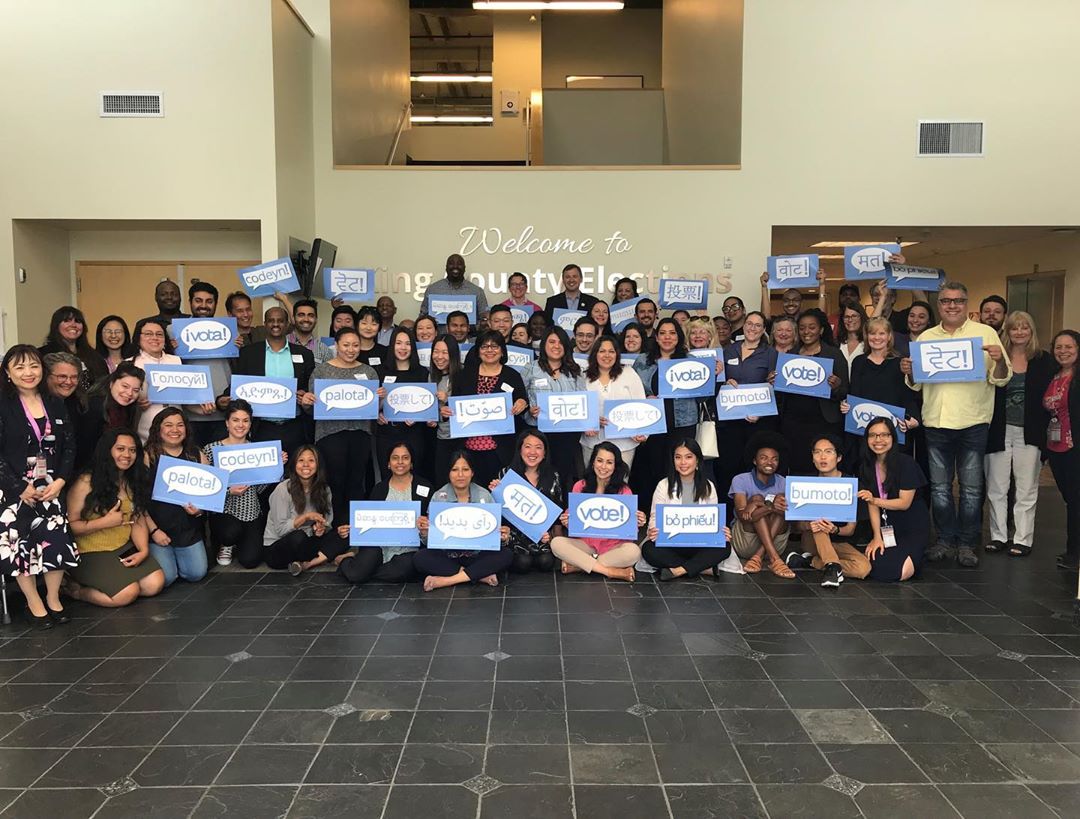Young people who are seventeen years of age but would turn eighteen by General Election Day would be allowed to vote in presidential primaries and Top Two elections under legislation that received final approval today in the Washington State Senate. ESB 6313, prime sponsored by Senator Marko Liias, is now on its way to Governor Jay Inslee after receiving an affirmative concurrence vote.
Known as the VOTE (Voting Opportunities Through Education) Act, ESB 6313 is a follow-up to the Democracy Access Package previously approved by legislators in the 2018 short session. It makes three important changes to state law:
- Allows persons to vote in a presidential primary or Top Two election if they are seventeen years old, but will be eighteen by the general election.
- Requires that the Department of Licensing provide an automated process for sixteen and seventeen year olds to sign up to register to vote.
- Requires that public universities, if requested by the student government, and certain public university branch campuses open student engagement hubs to provide ballots.
The VOTE Act has two effective dates. Most of the legislation takes effect January 1st, 2022. Some provisions will take effect September 1st, 2023. The entire bill will be in effect before voting begins in the 2024 presidential election cycle.
Republicans refused to support the legislation in both the Senate and the House of Representatives, leaving Democrats to pass it on their own.
The Senate roll call on concurrence was as follows:
ESB 6313
Young voters
Senate vote on Final Passage as Amended by the House
3/7/2020Yeas: 27; Nays: 21; Excused: 1
Voting Yea: Senators Billig, Carlyle, Cleveland, Conway, Darneille, Das, Dhingra, Frockt, Hasegawa, Hunt, Keiser, Kuderer, Liias, Lovelett, McCoy, Mullet, Nguyen, Pedersen, Randall, Rolfes, Saldaña, Salomon, Stanford, Takko, Van De Wege, Wellman, Wilson (Claire)
Voting Nay: Senator Becker, Braun, Brown, Ericksen, Fortunato, Hawkins, Holy, Honeyford, King, Muzzall, O’Ban, Padden, Rivers, Schoesler, Sheldon, Short, Wagoner, Walsh, Warnick, Wilson (Lynda), Zeiger
Excused: Senator Hobbs
Senator Hans Zeiger, speaking for the Senate Republican caucus, argued the bill should not be passed because the United States Constitution and Washington State Constitution specify that the minimum age to vote is eighteen.
However, Zeiger is incorrect.
For reference, here’s what our federal constitution says:
United States Constitution: Amendment XXVI
SECTION 1.
The right of citizens of the United States, who are eighteen years of age or older, to vote shall not be denied or abridged by the United States or by any State on account of age.SECTION 2.
The Congress shall have power to enforce this article by appropriate legislation.
And here’s what our state Constitution says:
Washington State Constitution: Amendment 63
SECTION 1. QUALIFICATIONS OF ELECTORS. All persons of the age of eighteen years or over who are citizens of the United States and who have lived in the state, county, and precinct thirty days immediately preceding the election at which they offer to vote, except those disqualified by Article VI, section 3 of this Constitution, shall be entitled to vote at all elections.
Senator Zeiger’s argument fails because the aforementioned provisions do not bar people under the age of eighteen from voting. The amendments say clearly that if you are eighteen years of age or older, you cannot be disqualified from voting on account of age. Meaning, someone under the age of eighteen can be disqualified under these provisions, but disqualification is not required.
Our interpretation is that the VOTE Act is constitutional.
It’s worth noting that seventeen other states currently allow seventeen year-olds to vote in primaries. They are Colorado, Connecticut, Delaware, Illinois, Indiana, Kentucky, Maine, Maryland, Mississippi, Nebraska, New Mexico, North Carolina, Ohio, South Carolina, Virginia, Vermont, and West Virginia.
There is no case law supporting Senator Zeiger’s interpretation.
“No case has tested whether the federal government possesses the power to prevent states from lowering their voting age below eighteen, since it has never tried to bar states from doing so,” journalist and historian Andrew Glass observed in a 2017 article for Politico that summarized Oregon v. Mitchell.
Our team at NPI is very much looking forward to enactment of ESB 6313 because adoption of this legislation will finally allow the presidential primary to reach “participation parity” with the Washington State Democratic Party’s previous system of presidential precinct caucuses for delegate allocation.
What do we mean by “participation parity”?
I’m referring to the fact that even though primaries are justifiably considered more inclusive and easier to participate in than caucuses, the Democratic Party’s precinct caucus system nonetheless used to have a couple of very interesting and important participation advantages over the presidential primary.
One of those advantages was same-day voter registration.
A person not registered to vote could fill out a voter registration form at a caucus and would be allowed to participate under party rules. Until last year, same-day voter registration was not allowed in Washington State. Now it is allowed, and a voter may register to vote right up until the deadline to return ballots. We were able to achieve same-day registration parity with the Democracy Access Package.
The second was that the Democratic Party’s rules explicitly allowed persons who would be eighteen years of age by the date of the November general election to vote in the caucus even if they were not eighteen as of the date of the caucus.
In previous legislative sessions, we asked the House and Senate to adopt legislation similar to ESB 6313 so that seventeen year olds turning eighteen by the November 2020 general election would be able to vote in the presidential primary.
Sadly, that did not happen, but at least now the Legislature has acted, and going forward, seventeen year olds will be able to vote in presidential primaries as well as Top Two elections, which are really the first round of the November general election. This is a big win for participation, inclusion, and democracy.
We thank the Legislature for getting this done. On to the bill signing!

